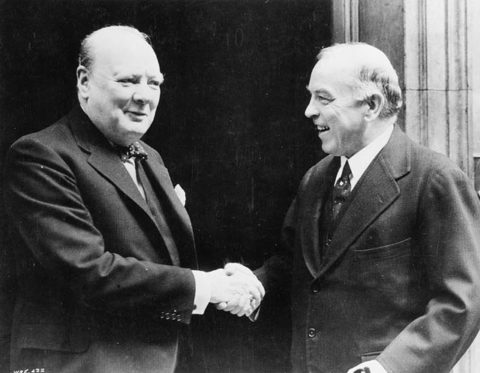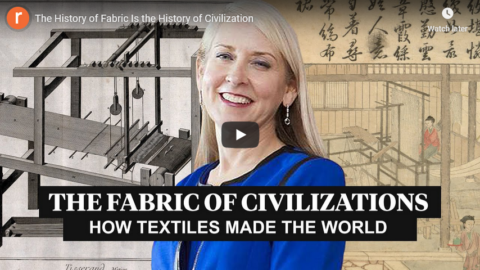ReasonTV
Published 23 Nov 2020Virginia Postrel’s new book explores economics, politics, and technology through textiles.
——————
Full text and links: https://reason.com/video/2020/11/23/t…Follow us on Twitter: https://twitter.com/reason
Reason is the planet’s leading source of news, politics, and culture from a libertarian perspective. Go to reason.com for a point of view you won’t get from legacy media and old left-right opinion magazines.
—————-The Fabric of Civilization: How Textiles Made the World, a new book by former Reason editor in chief Virginia Postrel, is a rich, endlessly fascinating history of the remarkable luck, invention, and innovation that made our fabric-rich world possible.
The book aims to make the mundane miraculous. Consider cotton. Most of the cotton we grow today is descended in part from a plant species that evolved in Africa and somehow got over to what is now Peru, where it mixed with New World strains.
“The fact that we have cotton at all, that it exists anywhere, is amazing,” says Postrel. “It happened long before there were human beings, but much more recently than when the continents were together. So we don’t know. It could have gotten caught up in a hurricane. It could have floated on a piece of pumice. So it’s this random, very unlikely happening that had tremendous world-changing consequences.”
The story of textiles is rife with attempts at protectionism and prohibition. In 17th and 18th century Europe, countries banned the importation of super-soft, super-colorful cotton prints from India known as calicos because they threatened domestic producers of everything from lower-quality cotton fabric to luxury silks. “For 73 years, France treated calico the way the U.S. treats cocaine,” Postrel says. “There was this huge amount of smuggling, and they were constantly ratcheting up the penalties [so] that they got quite grotesque, at least for the major traffic.” Some of “the earliest writings of classical liberalism are in this context, people saying not only is this not working, but … it is unjust to be sentencing people to the galleys in order to protect silk makers’ profits.”
Postrel also documents how the Luddites, the 19th century English textile workers famous for smashing the power looms threatening to put them out of work, owed their jobs to an earlier technological breakthrough: the spinning machines that emerged in the late 1700s.
“If you go back to that earlier period, when spinning machines were introduced, the same thing happened,” she says. “They had their own period of rebelling against the new technologies and saying they’re putting people out of work.”
The book also upends some contemporary myths, such as the claim that commercial production of hemp for clothing was a casualty of the war on drugs. “Hemp historically was a very coarse kind of fabric for poor people who didn’t have an alternative,” says Postrel. “It was replaced by cotton for good reasons. Cotton was also affordable, but it was soft and washable and just a much better fabric.”
“Human beings live in history and we inherit the legacies, positive and negative, of that history,” says Postrel, whose previous books include The Power of Glamour, The Substance of Style, and The Future and Its Enemies. Discussing the large themes of her work she says, “All you can do is start from where you are and try to do better from where you are.”
Narrated by Nick Gillespie. Edited by Isaac Reese.
Music: “Thoughts,” by ANBR
Photos: World History Archive/Newscom; The Print Collector Heritage Images/Newsroom; The “Réale” returning to port, Med/CC BY-SA 3.0; Smithsonian National Museum of African American History and Culture/CC0; Battle of Grand Port, Rama/Wikimedia Commons/CC BY-SA 2.0 FR; Fine Art Images Heritage Images/Newscom; Seton, M., Müller, R., Zahirovic, S., Gaina, C., Torsvik, T., Shephard, G., Talsma, A., Gurnis, M., Turner, M., Maus, S., and Chandler, M., 2012, Global continental and ocean basin reconstructions since 200 Ma: Earth-Science Reviews, v. 113, no. 3-4, p. 212-270
November 24, 2020
The History of Fabric Is the History of Civilization
Is the day of the orator over?
In The Critic, Nigel Jones considers some of the great orators of history:

Prime Minister Winston Churchill greets Canadian PM William Lyon Mackenzie King, 1941. Churchill was certainly one of the great orators of history … Mackenzie King, on the other hand, certainly was not.
Photo from Library and Archives Canada (reference number C-047565) via Wikimedia Commons.
On 19 November 1863, President Abraham Lincoln rose to speak at Gettysburg, Pennsylvania, the battlefield which four and a half months before had seen the decisive turning point of the American Civil War. Lincoln was not even the principal speaker at the ceremony to dedicate a cemetery for those who had fallen in the battle.
Before he spoke, the President had to sit through a two-hour address by a pompous official orator, a windbag called Edward Everett. But when he finally got to his feet Lincoln entered political immortality. He spoke for only two minutes, but the few words he uttered about “Government of the people, by the people, and for the people” have echoed down the years – even Mrs Thatcher made a recording of them – inspiring and rousing generations to value and defend democracy.
Winston Churchill’s iconic status as Britain’s greatest Prime Minister largely rests on the handful of radio speeches he growled out to the nation in the darkest days of World War Two: “… fight them on the beaches … so much owed by so many to so few … this was their finest hour …” and so on.
Ever since Roman statesmen such as Cato and Cicero delivered their speeches on the Capitol, oratory like that spoken by Lincoln and Churchill has been a mainstay of western civilisation and governance. A carefully constructed argument or a few ringing phrases having the power to change minds, stiffen sinews, and bring down leaders.
Churchill himself was brought to supreme political power in 1940 by the power of the spoken word. Those words were spoken by one politician – his friend and schoolmate Leo Amery – quoting another, when Amery repeated Oliver Cromwell’s words dismissing the Long Parliament in calling for the end of Neville Chamberlain’s feeble administration: “You have sat here too long for any good you have been doing. Depart, I say, and let us have done with you: in the name of God, go!” Chamberlain, albeit reluctantly, went.
Ten Minute History – The Thirty Years’ War
History Matters
Published 30 Sep 2018Twitter: https://twitter.com/Tenminhistory
Patreon: https://www.patreon.com/user?u=4973164Special Thanks to the following Patrons for their support on Patreon:
Chris Fatta
Joshua
Mitchell Wildoer
Mason Cox
William Foster
Thomas Mitchell
Perry Gagne
Shaun Pullin
Anon
Spencer Smith
Matt M
RbjThis episode of Ten Minute History (like a documentary, only shorter) covers the outbreak of the Bohemian Revolt which was what would eventually spiral out of control into the Thirty Years’ War. The revolt was crushed fairly quickly but sparked intervention by Denmark, who didn’t do too well, and later Sweden who did very well. Both of these were aided by France who decided to get directly involved in 1635. By 1648 the Holy Roman Empire lay in ruins, with Austria and Spain struggling to pay for the war and rebuild the Habsburg Empire. This war saw the rise of Sweden and France but most importantly saw the foundations of modern diplomacy built.
Recommended books:
Mark Greengrass – Christendom Destroyed: Europe 1517-1648. Does a great job of outlying the theological currents in Europe at the time and how all of the religious changes led to the Thirty Years’ War.
Peter H. Wilson – Europe’s Tragedy: A New History of the Thirty Years’ War. The go-to text for the war; incredibly detailed and honestly can’t be beat for the topic. 100% recommend.
QotD: Canada’s economic Stockholm Syndrome
Trade agreements are always about “concessions” in which foreign suppliers are grudgingly given — or, more often, indignantly denied — the right to sell Canadians goods and services at prices lower than what we pay now. Let’s be clear here: lowering the price of consumer goods and services has the exact same effect on household welfare as an increase in incomes. But I defy you to name an elected politician who will list “the ability to buy cheaper stuff” as the most compelling reason to support free trade: more than 200 years since Adam Smith wrote that paragraph, our trade agenda is still written by and for producer interests.
We’re stuck with a system in which producer interests — most notoriously the dairy cartel that operates under the name of “supply management” — hold the rest of us hostage. Dismantling the dairy cartel is an act that would significantly increase consumers’ buying power, but this is a measure that the Conservatives have all but ruled out under any circumstances, and the NDP has made maintaining the cartel a condition for supporting any sort of trade agreement.
Why would the [major parties] stubbornly insist on sticking to a policy that makes consumers worse off at the expense of producers? Because it’s a popular position. It’s one of the marvels of the Canadian electorate. Show Canadians a special interest group that uses its government-granted privileges to fleece consumers, and they’ll embrace it as a “national champion,” a “uniquely Canadian way of life” or some equally vapid catch-phrase.
This is from the Wikipedia entry for Stockholm Syndrome:
Stockholm syndrome, or capture–bonding, is a psychological phenomenon in which hostages express empathy and sympathy and have positive feelings toward their captors, sometimes to the point of defending them.
What we suffer from is the economic policy equivalent. Call it “Canada Syndrome”: a tendency for consumers to identify with the producer interests that are holding them hostage.
Stephen Gordon, “Our Stockholm Syndrome about supply management”, Maclean’s, 2013-03-05.





